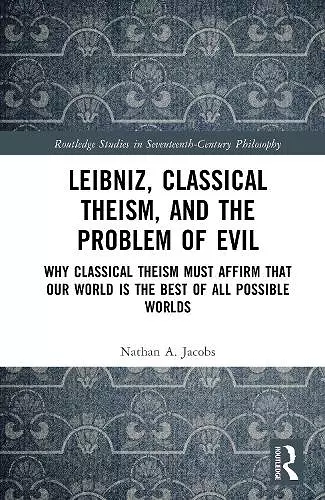Leibniz, Classical Theism, and the Problem of Evil
Why Classical Theism Must Affirm That Our World is the Best of All Possible Worlds
Format:Hardback
Publisher:Taylor & Francis Ltd
Publishing:24th Jul '25
£145.00
This title is due to be published on 24th July, and will be despatched as soon as possible.

This volume offers a defense of Leibniz’s theodicy and his infamous claim that our world is the best of all possible worlds. It considers Leibniz’s rationale for “optimism,” examines its roots in ancient and medieval thought, and forwards a novel rereading of Leibniz’s theory of freedom in light of this background, all of which highlights the very real challenges of evading optimism from within the framework of classical theism.
Gottfried Leibniz is known for his “theodicy,” or defense of God against the problem of evil. This book argues that Leibniz’s optimism is inevitable for proponents of classical theism, and even for many not-so-classical theists. The author’s argument is threefold. First, he demonstrates that Leibniz's theodicy is deeply rooted in the classical theist tradition, pagan and Christian, and the philosopher of Leipzig is merely following these commitments to their logical conclusion, a conclusion that long precedes Leibniz. Second, he offers a novel rereading of Leibniz in the light of his philosophical and theological antecedents, a reading that, if correct, dispels ubiquitous but problematic assumptions about Leibniz's case, specifically those about divine and human freedom. Third, he demonstrates the analytic tether that connects classical theism to Leibniz’s conclusion, making his notorious optimism virtually inevitable for proponents of classical theism — and even for not-so-classical theists. This book demonstrates the ways in which Leibniz is relevant to not only classical theists and students of Modern philosophy but also to contemporary philosophy of religion more generally and philosophical theologians who are concerned with the problem of evil.
Leibniz, Classical Theism, and the Problem of Evil will appeal to scholars and graduate students interested in Leibniz, philosophy of religion, history of philosophy, philosophical theology, and the problem of evil.
“This book is an important contribution to philosophical theology, the problem of evil, and the history of dogmatics. There are few works available that explore Leibniz on the problem of evil, but even fewer that integrate the study with classical theism that is also consistent with common themes in the wider Christian tradition. The present study will be of interest not only to philosophers and historians, but to dogmatic theologians.”
Joshua Farris, Missional University, USA
“After more than 200 years, it is rare for a book to capture something vital and new in one of the established philosophical subcultures of Modern thought. Jacobs’s book on Leibniz and theodicy does exactly that. While marshaling an impressive array of resources fore and aft Leibniz, Jacobs presents a compelling case for maintaining a robust understanding of Leibniz on human freedom in harmony with divine foreknowledge and predetermination. This book provides a much-needed corrective to the field, and is sure to provide healthy new fodder for contemporary discussions on the problem of evil.”
Chris L. Firestone, Trinity International University, USA
“This work is poised to overturn modern philosophy with its distinctive portrayal of the thought of Gottfried Leibniz. Gone is the portrait of the determinist-compatibilist who advances a novel theological optimism, where ours is the best of all possible worlds. What emerges is a Leibniz who advances a defensible libertarian account of freedom, where the traditional theist cannot posit that any world could surpass our own. Capably leading the reader through dense conceptual territory from medieval scholastics, accounts of human agency and action, possible worlds, the freedom-determinism divide, etc. Jacobs provides a wealth of insight reaching deeply into ancient, medieval, and modern philosophy.”
James H. Joiner, Northern Arizona University, USA
ISBN: 9781032739212
Dimensions: unknown
Weight: unknown
382 pages